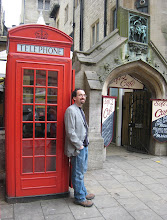Organization is not my strong point. Anyone who has seen my office, or my apartment can vouch for this. Starting my new life as a professor last year, I was worried that lack of organization – particularly in running a research group - might be my downfall. For me, in fact, the entire concept of research is fundamentally disorganized – and I’ve always felt that this is a good thing, since random wandering encourages random discovery.
Some professors do manage to run large organized groups. I think the larger the group, the more organized it has to be. Some even have detailed hierarchical structures, including lieutenants (pronounced “leftenants” over here), sergeants, and so forth. Each person has a unique and well defined project. Higher rank members oversee lower-rank members. They have group meetings periodically where one person reports on their progress, and research gets done very methodically. The top dog doles out the projects and sets the overall directions. The foot soldiers take their orders and produce the results.
But for many theoretical physicists that I know, this is not at all how research works. A more accurate description is that a researcher has some general field of interest and they simply mess around with ideas in that field until they figure out something interesting to work on. They work on this interesting idea for a while, two steps forward, one step back, and eventually do manage to make progress. But this type of messing around is not something that is easily organized. And it is particularly hard to oversee someone else’s messings and decide whether they are messing around correctly or not. Such researchers tend to have smaller research groups and tend to interact much more closely with their students and postdocs.
Of course when it finally comes time to publish discoveries, I do think it is very important to present a very organized picture of what you have found, and I do agonize over the organizations of my publications and talks. But this is more an exercise in covering your tracks and making it look like you knew where you were going all along.
Just sayin'...
Subscribe to:
Post Comments (Atom)

4 comments:
But then how do you go about writing a research proposal? "I plan to mess around with interesting ideas for while, and if previous experience is any guide, eventually stumble on something worth publishing."
Darn good question. And in fact, I think that many theorists struggle with this question. One approach is to write grant proposals about things that you have essentially already completed (but not written up). Another approach is to write the proposal about some fraction of your projects that are more predictable (we are going to calculate X). Or you just make up something that sounds good -- for most granting systems, they never look and see if you actually did what you said you would do ... as long as you did something interesting that is OK. (Exception is DARPA where they really do care).
(Not necessarily for posting)
Of course there are downsides to being disorganized, like putting your new pants somewhere and then forgetting you have them.
I resemble that comment!
Post a Comment